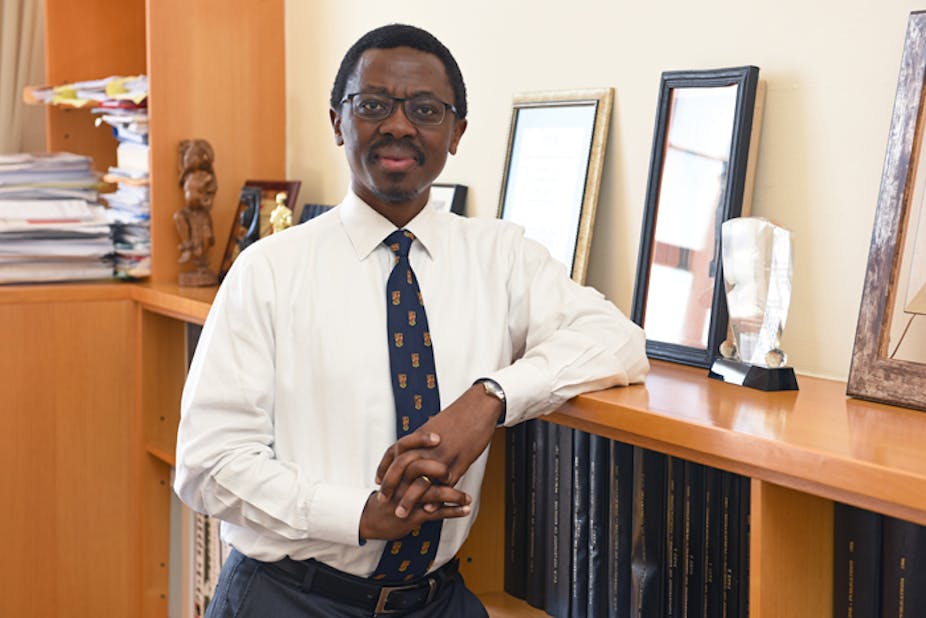South Africa’s medical fraternity is mourning the death of renowned academic and cardiologist Professor Bongani Mayosi. Mayosi, who was the Dean of the Faculty of Health Sciences at the University of Cape Town, was 51-years-old. He was a National Research Foundation A-rated scientist.
Mayosi’s family issued a statement after his death in which they described his battle with depression and called his death “a desperate decision to end his own life”. Tributes have poured in from many of his colleagues and former students: Mayosi was a committed mentor to many young medical students. Tolullah Oni, who previously worked with Mayosi at the University of Cape Town, spoke with Zolelwa Sifumba about Mayosi’s legacy as a mentor.
Tell us a little bit about yourself and how you ended up meeting Professor Mayosi.
My name is Dr Zolelwa Sifumba; I’m an intern working at Prince Mshiyeni Hospital in KwaZulu-Natal. I am originally from the Eastern Cape and completed my medical degree at the University of Cape Town (UCT) in 2017.
In my junior years at UCT medical school, as a young black person I was always so inspired by the black seniors and academics on campus. They always served as an encouragement that I could also reach the status of being a well-respected professional in the field of medicine. Professor Mayosi was top of that list.
I remember passing him in corridors with my friends and just staring, thinking, “Wow.” As I reached my senior years I started to understand and engage with the research he did and its relevance, his accomplishments and the difference his work was making; luckily I even managed to be on a few ward rounds and in cardiology tutorials with him.
We met properly in painful circumstances. In 2012 I was diagnosed with Multi Drug Resistant TB because I’d been exposed to it at work. The following year, I was struggling with the treatment and its side effects. Professor Mayosi helped bridge the information gap between me and my family; they were far away at the time. He advised my parents that the insertion and use of a port to receive the injectable TB medication would be the best option to ensure my survival.
Later, he motivated for a much needed leave of absence from medical school. Honestly, that saved my life.
He managed to reassure my parents that taking time off to recover fully would not negatively affect my prospects of returning to complete my degree.
How did he influence you as a medical student, and now as a medical intern?
Through his example and great achievements, he taught me the importance of hard work and that even I could make a difference in the world.
In tutorials, he taught us not just the basics of cardiology but also to think critically when learning – not only to read but to try to understand. He taught us to also be human with patients. While watching him on ward rounds, he taught me a level of confidence, clinical knowledge and excellence to aspire to.
I know that your experience has influenced your passion to work as an advocate for the health and well-being of health professionals. Can you speak to what lessons you’ll take from Professor Mayosi into this and other aspects of your work and life in future?
Professor Mayosi encouraged the advocacy work I do around the health of health care professionals. We were also in conversation about how to increase awareness at medical school around issues of occupational exposure to TB.
I was especially looking forward to engaging with him on this, as I felt he understood my plight after having seen me suffer through TB; he would do all he could to ensure that I was able to assist our faculty in instituting a TB programme.
This support was not limited to his time as Dean. While he was Head of the Department of Medicine at Groote Schuur Hospital, he invited me to address senior management on matters regarding TB on campus, which was amazing for me. It showed that he not only understood my fight, but would fully support me.
After the meeting he gave me pointers to look at and tackle to reach the next level of seeing my dreams for the faculty becoming a reality, which was so encouraging. To have the Dean of a medical school who is an accomplished world renowned scientist agree with you, support you and allow you opportunities to make a difference was honestly incredible.
He showed me that my fight was relevant and that he supported it, which taught me to continue to fight and advocate for change.
Clearly he was a powerful mentor. Why are good mentors so important in a field like medicine?
The presence of good mentors serves as encouragement that it’s possible to reach heights you never knew existed. Their presence serves as a guide as to how to become what you want to become, also at times further stretching definitions of greatness. Their presence creates an environment that bolsters the strive for greatness within others. They serve to inspire, to educate, to show the way forward, to encourage, to work with, to lead and for us to follow.
Professor Mayosi was a great mentor to me. In losing him to mental illness, I am reminded that we are all human. This illness, which I and many others have suffered with, has nothing to do with being weak. It’s a part of the human condition for many of us and I pray that through this, many will begin to engage on the issue of mental well-being in health care workers.

